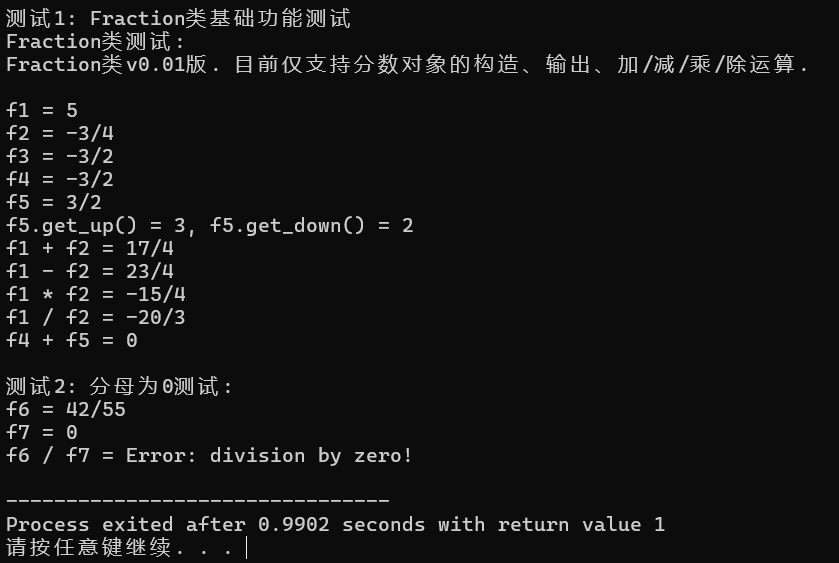实验二 现代C++编程初体验
任务一: 代码:
#pragma once #include <string> // 类T: 声明 class T { // 对象属性、方法 public: T(int x = 0, int y = 0); // 普通构造函数 T(const T &t); // 复制构造函数 T(T &&t); // 移动构造函数 ~T(); // 析构函数 void adjust(int ratio); // 按系数成倍调整数据 void display() const; // 以(m1, m2)形式显示T类对象信息 private: int m1, m2; // 类属性、方法 public: static int get_cnt(); // 显示当前T类对象总数 public: static const std::string doc; // 类T的描述信息 static const int max_cnt; // 类T对象上限 private: static int cnt; // 当前T类对象数目 // 类T友元函数声明 friend void func(); }; // 普通函数声明 void func();
#include "T.h" #include <iostream> void test_T(); int main() { std::cout << "test Class T: \n"; test_T(); std::cout << "\ntest friend func: \n"; func(); } void test_T() { using std::cout; using std::endl; cout << "T info: " << T::doc << endl; cout << "T objects'max count: " << T::max_cnt << endl; cout << "T objects'current count: " << T::get_cnt() << endl << endl; T t1; cout << "t1 = "; t1.display(); cout << endl; T t2(3, 4); cout << "t2 = "; t2.display(); cout << endl; T t3(t2); t3.adjust(2); cout << "t3 = "; t3.display(); cout << endl; T t4(std::move(t2)); cout << "t4 = "; t4.display(); cout << endl; cout << "test: T objects'current count: " << T::get_cnt() << endl; }
#include "T.h" #include <iostream> #include <string> // 类T实现 // static成员数据类外初始化 const std::string T::doc{"a simple class sample"}; const int T::max_cnt = 999; int T::cnt = 0; // 类方法 int T::get_cnt() { return cnt; } // 对象方法 T::T(int x, int y): m1{x}, m2{y} { ++cnt; std::cout << "T constructor called.\n"; } T::T(const T &t): m1{t.m1}, m2{t.m2} { ++cnt; std::cout << "T copy constructor called.\n"; } T::T(T &&t): m1{t.m1}, m2{t.m2} { ++cnt; std::cout << "T move constructor called.\n"; } T::~T() { --cnt; std::cout << "T destructor called.\n"; } void T::adjust(int ratio) { m1 *= ratio; m2 *= ratio; } void T::display() const { std::cout << "(" << m1 << ", " << m2 << ")" ; } // 普通函数实现 void func() { T t5(42); t5.m2 = 2049; std::cout << "t5 = "; t5.display(); std::cout << '\n'; }

问题一:能成功运行
问题二:普通构造函数:初始化对象成员,所以在创建对象时调用
复制构造函数:用已有左值对象拷贝初始化新对象,在对象拷贝时调用
移动构造函数:用右值对象初始化新对象,在右值对象初始化时调用
析构函数:减少对象计数、释放资源,在对象作用结束时调用
问题三:能成功运行
任务二:
task2.cpp代码:
#include<Complex.h> #include <iostream> #include <iomanip> #include <complex> void test_Complex(); void test_std_complex(); int main() { std::cout << "*******测试1: 自定义类Complex*******\n"; test_Complex(); std::cout << "\n*******测试2: 标准库模板类complex*******\n"; test_std_complex(); } void test_Complex() { using std::cout; using std::endl; using std::boolalpha; cout << "类成员测试: " << endl; cout << Complex::doc << endl << endl; cout << "Complex对象测试: " << endl; Complex c1; Complex c2(3, -4); Complex c3(c2); Complex c4 = c2; const Complex c5(3.5); cout << "c1 = "; output(c1); cout << endl; cout << "c2 = "; output(c2); cout << endl; cout << "c3 = "; output(c3); cout << endl; cout << "c4 = "; output(c4); cout << endl; cout << "c5.real = " << c5.get_real() << ", c5.imag = " << c5.get_imag() << endl << endl; cout << "复数运算测试: " << endl; cout << "abs(c2) = " << abs(c2) << endl; c1.add(c2); cout << "c1 += c2, c1 = "; output(c1); cout << endl; cout << boolalpha; cout << "c1 == c2 : " << is_equal(c1, c2) << endl; cout << "c1 != c2 : " << is_not_equal(c1, c2) << endl; c4 = add(c2, c3); cout << "c4 = c2 + c3, c4 = "; output(c4); cout << endl; } void test_std_complex() { using std::cout; using std::endl; using std::boolalpha; cout << "std::complex<double>对象测试: " << endl; std::complex<double> c1; std::complex<double> c2(3, -4); std::complex<double> c3(c2); std::complex<double> c4 = c2; const std::complex<double> c5(3.5); cout << "c1 = " << c1 << endl; cout << "c2 = " << c2 << endl; cout << "c3 = " << c3 << endl; cout << "c4 = " << c4 << endl; cout << "c5.real = " << c5.real() << ", c5.imag = " << c5.imag() << endl << endl; cout << "复数运算测试: " << endl; cout << "abs(c2) = " << abs(c2) << endl; c1 += c2; cout << "c1 += c2, c1 = " << c1 << endl; cout << boolalpha; cout << "c1 == c2 : " << (c1 == c2)<< endl; cout << "c1 != c2 : " << (c1 != c2) << endl; c4 = c2 + c3; cout << "c4 = c2 + c3, c4 = " << c4 << endl; }
Complex.h代码:
#pragma once #include <iostream> #include <string> #include <cmath> class Complex { private: double real; double imag; public: static const std::string doc; Complex(double r = 0.0, double i = 0.0) : real(r), imag(i) {} double get_real() const { return real; } double get_imag() const { return imag; } void add(const Complex& other) { real += other.real; imag += other.imag; } friend void output(const Complex& c); friend double abs(const Complex& c); friend bool is_equal(const Complex& c1, const Complex& c2); friend bool is_not_equal(const Complex& c1, const Complex& c2); friend Complex add(const Complex& c1, const Complex& c2); }; const std::string Complex::doc = "a simplified Complex class"; void output(const Complex& c); double abs(const Complex& c); bool is_equal(const Complex& c1, const Complex& c2); bool is_not_equal(const Complex& c1, const Complex& c2); Complex add(const Complex& c1, const Complex& c2);
complex.h的实现代码:
#include "Complex.h" #include <iostream> void output(const Complex& c) { if (c.imag >= 0) { std::cout << c.real << " + " << c.imag << "i"; } else { std::cout << c.real << " - " << -c.imag << "i"; } } double abs(const Complex& c) { return sqrt(c.real * c.real + c.imag * c.imag); } bool is_equal(const Complex& c1, const Complex& c2) { const double eps = 1e-9; return (fabs(c1.real - c2.real) < eps) && (fabs(c1.imag - c2.imag) < eps); } bool is_not_equal(const Complex& c1, const Complex& c2) { return !is_equal(c1, c2); } Complex add(const Complex& c1, const Complex& c2) { return Complex(c1.real + c2.real, c1.imag + c2.imag); }
问题一:使用标准库模板类 complex更简洁
问题二:1.是的
2.否
3.当函数需要直接访问类的私有成员,且该函数不是类的成员函数的时候
任务三:
PlayerControl.cpp代码:
#include "PlayerControl.h" #include <iostream> #include <algorithm> int PlayerControl::total_cnt = 0; PlayerControl::PlayerControl() {} // 待补足 // 1. 将输入字符串转为小写,实现大小写不敏感 // 2. 匹配"play"/"pause"/"next"/"prev"/"stop"并返回对应枚举 // 3. 未匹配的字符串返回ControlType::Unknown // 4. 每次成功调用parse时递增total_cnt ControlType PlayerControl::parse(const std::string& control_str) { std::string lower_str = control_str; std::transform(lower_str.begin(), lower_str.end(), lower_str.begin(), ::tolower); ControlType result = ControlType::Unknown; if (lower_str == "play") { result = ControlType::Play; } else if (lower_str == "pause") { result = ControlType::Pause; } else if (lower_str == "next") { result = ControlType::Next; } else if (lower_str == "prev") { result = ControlType::Prev; } else if (lower_str == "stop") { result = ControlType::Stop; } else { result = ControlType::Unknown; } total_cnt++; return result; } void PlayerControl::execute(ControlType cmd) const { switch (cmd) { case ControlType::Play: std::cout << "[play] Playing music...\n"; break; case ControlType::Pause: std::cout << "[Pause] Music paused\n"; break; case ControlType::Next: std::cout << "[Next] Skipping to next track\n"; break; case ControlType::Prev: std::cout << "[Prev] Back to previous track\n"; break; case ControlType::Stop: std::cout << "[Stop] Music stopped\n"; break; default: std::cout << "[Error] unknown control\n"; break; } } int PlayerControl::get_cnt() { return total_cnt; }

任务:四:
Fraction.h代码:
#include "Fraction.h" #include <iostream> void test1(); void test2(); int main() { std::cout << "测试1: Fraction类基础功能测试\n"; test1(); std::cout << "\n测试2: 分母为0测试: \n"; test2(); } void test1() { using std::cout; using std::endl; cout << "Fraction类测试: " << endl; cout << Fraction::doc << endl << endl; Fraction f1(5); Fraction f2(3, -4), f3(-18, 12); Fraction f4(f3); cout << "f1 = "; output(f1); cout << endl; cout << "f2 = "; output(f2); cout << endl; cout << "f3 = "; output(f3); cout << endl; cout << "f4 = "; output(f4); cout << endl; const Fraction f5(f4.negative()); cout << "f5 = "; output(f5); cout << endl; cout << "f5.get_up() = " << f5.get_up() << ", f5.get_down() = " << f5.get_down() << endl; cout << "f1 + f2 = "; output(add(f1, f2)); cout << endl; cout << "f1 - f2 = "; output(sub(f1, f2)); cout << endl; cout << "f1 * f2 = "; output(mul(f1, f2)); cout << endl; cout << "f1 / f2 = "; output(div(f1, f2)); cout << endl; cout << "f4 + f5 = "; output(add(f4, f5)); cout << endl; } void test2() { using std::cout; using std::endl; Fraction f6(42, 55), f7(0, 3); cout << "f6 = "; output(f6); cout << endl; cout << "f7 = "; output(f7); cout << endl; cout << "f6 / f7 = "; output(div(f6, f7)); cout << endl; }
Fraction.cpp代码:
#include "Fraction.h" #include <iostream> #include <cmath> // 静态成员初始化 const std::string Fraction::doc = "Fraction类v0.01版. 目前仅支持分数对象的构造、输出、加/减/乘/除运算."; // 构造函数实现 Fraction::Fraction(int u, int d) : up(u), down(d) { if (down == 0) { std::cerr << "Error: zero denominator not permitted!" << std::endl; exit(1); // 分母为0直接终止程序(或可抛异常,此处简化处理) } normalize(); } Fraction::Fraction(const Fraction& other) : up(other.up), down(other.down) { // 拷贝构造时已保证规范化,无需额外处理 } // 辅助函数:最大公约数(欧几里得算法) int Fraction::gcd(int a, int b) { a = std::abs(a); b = std::abs(b); while (b != 0) { int temp = b; b = a % b; a = temp; } return a; } // 辅助函数:分数规范化(约分、符号统一) void Fraction::normalize() { if (down < 0) { // 分母为负,符号转移到分子 up = -up; down = -down; } int g = gcd(up, down); if (g != 0) { up /= g; down /= g; } } // 成员方法:返回自身的负数 Fraction Fraction::negative() const { return Fraction(-up, down); } // 友元函数:输出分数 void output(const Fraction& f) { if (f.down == 1) { std::cout << f.up; } else { std::cout << f.up << "/" << f.down; } } // 友元函数:分数加法 Fraction add(const Fraction& f1, const Fraction& f2) { int u = f1.up * f2.down + f2.up * f1.down; int d = f1.down * f2.down; return Fraction(u, d); // 构造时自动规范化 } // 友元函数:分数减法 Fraction sub(const Fraction& f1, const Fraction& f2) { int u = f1.up * f2.down - f2.up * f1.down; int d = f1.down * f2.down; return Fraction(u, d); } // 友元函数:分数乘法 Fraction mul(const Fraction& f1, const Fraction& f2) { int u = f1.up * f2.up; int d = f1.down * f2.down; return Fraction(u, d); } // 友元函数:分数除法 Fraction div(const Fraction& f1, const Fraction& f2) { if (f2.up == 0) { std::cerr << "Error: division by zero!" << std::endl; exit(1); } int u = f1.up * f2.down; int d = f1.down * f2.up; return Fraction(u, d); }

问题:用的是友元函数来解决问题。友元方案的优势:可以直接访问类的私有成员,更加简洁高效。 友元方案的缺点:一定程度上破坏了类的封装性,因为友元函数可以直接操作私有成员。


 浙公网安备 33010602011771号
浙公网安备 33010602011771号